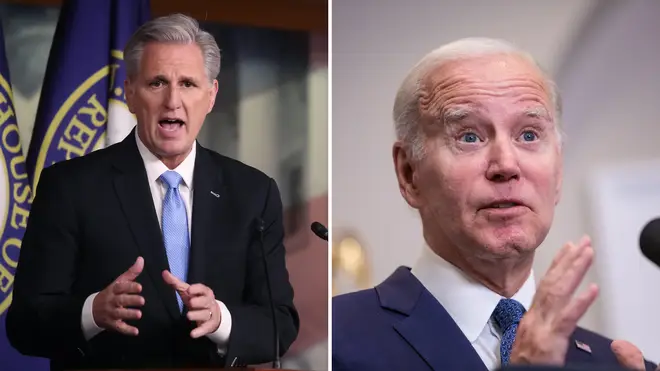
Dom Joly 7pm - 10pm
1 June 2023, 05:55 | Updated: 1 June 2023, 06:27

The US House of Representatives has approved a deal to raise the country's debt ceiling after President Joe Biden and Speaker Kevin McCarthy assembled a bipartisan coalition to support the measure.
The deal, which aims to avoid a "catastrophic" scenario where the United States defaults on its national debts, passed through the Republican-controlled house with by 314 to 117 votes.
It will now move to the Senate, where its majority leader - Chuck Schumer - said the bill will be passed quickly.
President Biden will need to have the deal approved by Monday, which is when the US federal government could run out of money.
This agreement is good news for the American people and the American economy," Mr Biden said.
"I urge the Senate to pass it as quickly as possible so that I can sign it into law."
Listen and subscribe to Unprecedented: Inside Downing Street on Global Player

Mr Biden sent top White House officials to the Capitol to shore up backing ahead of the crunch vote.
Meanwhile, Mr McCarthy worked to sell sceptical fellow Republicans, even fending off challenges to his leadership, in the rush to avert a potentially disastrous US default.
Swift passage later in the week by the Senate would ensure government checks will continue to go out to Social Security recipients, veterans and others and would prevent financial upheaval at home and abroad.
Next Monday is when the US Treasury has said the country would run short of money to pay its debts.
Read More: Biden approves extra 300 million dollars in military aid for Ukraine
Read More: Volodymyr Zelenskyy welcomes Joe Biden backing plan to help Ukraine with fighter jets
Mr Biden and Mr McCarthy were counting on support from the political centre, a rarity in divided Washington, testing the leadership of the Democratic president and the Republican speaker.
Overall, the 99-page Bill restricts spending for the next two years, suspends the debt ceiling into January 2025 and changes some policies, including imposing new work requirements for older Americans receiving food aid.
Raising the nation's debt limit, now 31 trillion dollars, ensures Treasury can borrow to pay already incurred US debts.